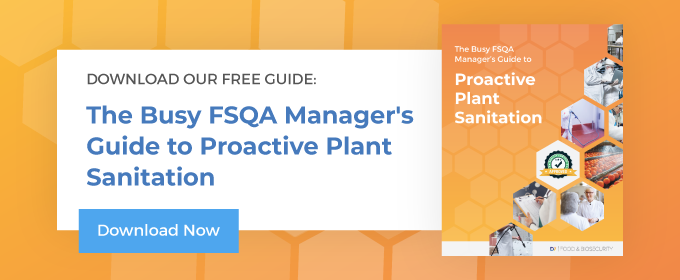 FSQA managers have a lot of tasks and priorities to juggle to keep production on schedule. When antibiotic-resistant biofilms are discovered, it can disrupt schedules, increase labor costs, and cause product delivery delays. Understanding what causes recurring biofilm formation and antibiotic resistance can help you take a proactive approach to prevention and help protect your brand’s reputation.
FSQA managers have a lot of tasks and priorities to juggle to keep production on schedule. When antibiotic-resistant biofilms are discovered, it can disrupt schedules, increase labor costs, and cause product delivery delays. Understanding what causes recurring biofilm formation and antibiotic resistance can help you take a proactive approach to prevention and help protect your brand’s reputation.
What Causes Antibiotic Resistance and Recurring Biofilm?
Biofilms are able to form when bacteria colonies are allowed to grow and an extracellular matrix develops to protect them. The protective barrier allows the bacteria within to have access to water and nutrients so they are able to multiply even when sanitation protocols are in place.
Antibiotic resistance can happen when the same disinfectant is used repeatedly and the bacteria build up a tolerance against it. The result is that more and more bacteria are left behind after sanitation, giving them a greater opportunity to multiply and potentially form a biofilm. One way to avoid this is by using a variety of products and periodically rotating their use. When coupled with a persistent biofilm, antibiotic resistance can be a real problem in food processing facilities.
Why Are Biofilms Hard to Treat?
The extracellular matrix in biofilms makes it difficult for many disinfectant products to penetrate and reach the bacteria beyond the barrier. Because of this, mechanical action is often required to disrupt the protective matrix. This isn’t too difficult to address on frequently used food preparation surfaces, which are sanitized often. However, invisible biofilms tend to form in difficult-to-reach areas, making it challenging to reach every affected area with mechanical scrubbing.
When parts of a biofilm are left behind, the colony can continue to grow and thrive. This is one factor that contributes to persistent biofilms. Taking a proactive approach to daily sanitation and periodic deep cleans can help prevent the formation of biofilms.
What Happens When Biofilms Are Left Untreated?
A persistent biofilm can have major repercussions, especially when it goes unnoticed and untreated. When biofilms are present on a surface, they shed bacteria when disrupted. When that surface is a food preparation area or food processing equipment, it can result in contamination. Untreated biofilm can lead to costly food recalls and consumer health impacts, resulting in damage to your brand. Biofilms can also cause damage to valuable equipment and shorten its life, impacting the bottom line.
How Decon7 Systems Can Help
Our patented D7 solution is able to penetrate and destroy biofilms without the need for mechanical action. Detergents in the formulation penetrate the extracellular matrix so the hydrogen peroxide can penetrate the cells and kill at the DNA level—a claim that most other disinfectants can’t make.
D7 is also easy to apply and helps you save on labor costs for daily sanitation or biofilm removal. Visible smart foam shows where the product has been applied so no areas are missed. When applied correctly, most teams are able to effectively remove resistant biofilm with a single application of D7. Application also takes significantly less time and labor than with products that require scrubbing.
Depending on the type of bacteria present on a surface, a biofilm can grow in a matter of hours or over several days. Understanding the type of biofilm that tends to form in your facility can help you create an effective plan. Decon7 Systems is here to help you develop a proactive sanitation plan that helps reduce the likelihood of resistant biofilm growth by deactivating free-floating bacteria before a biofilm can form.
To learn more about D7 and how a comprehensive sanitation plan helps protect your brand, read The Busy FSQA Manager's Guide to Proactive Plant Sanitation.


